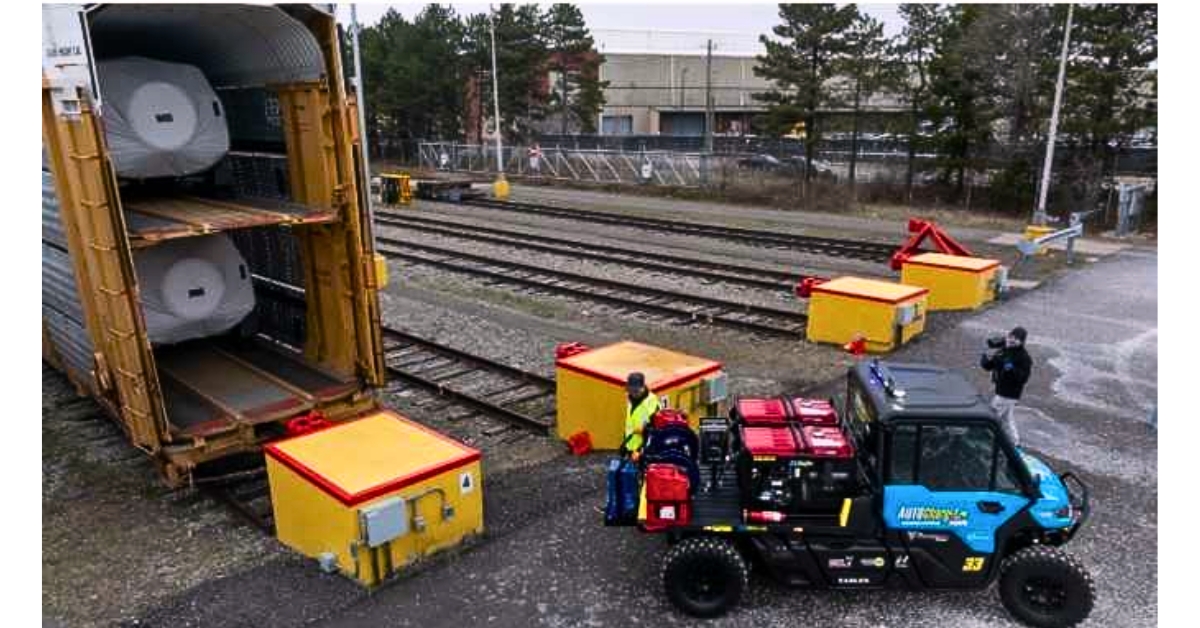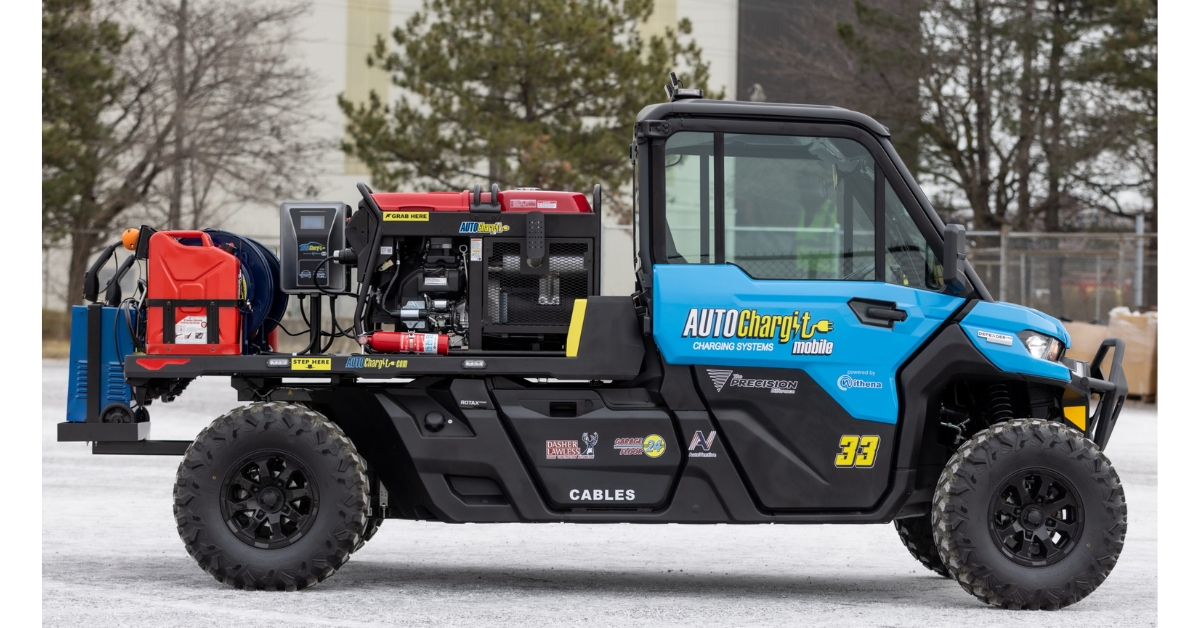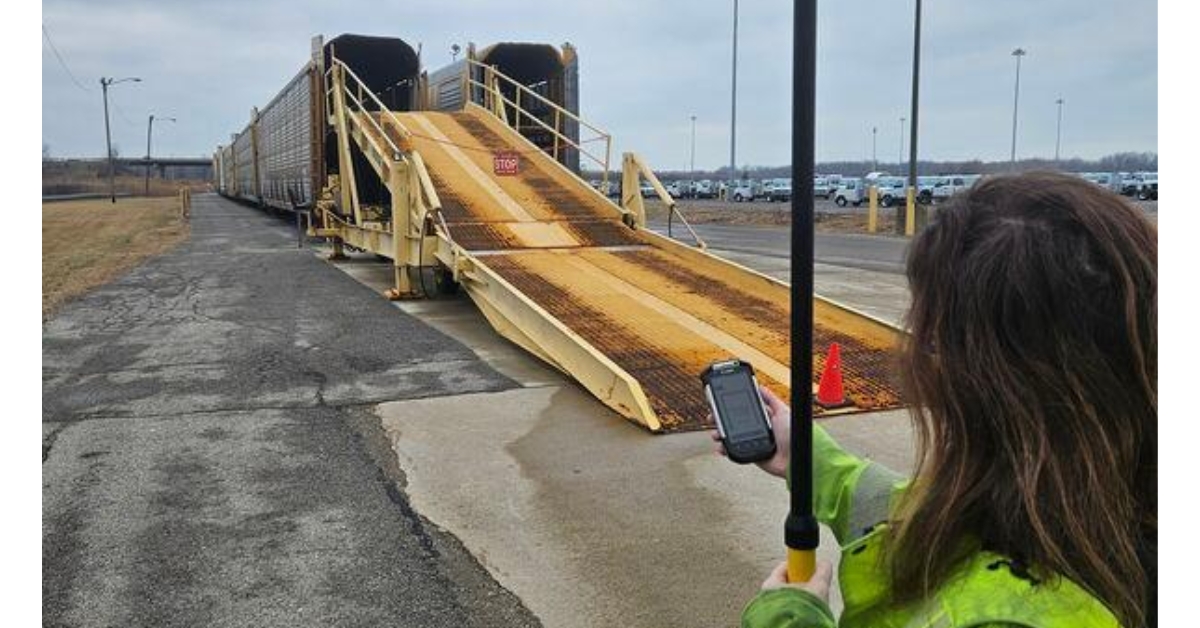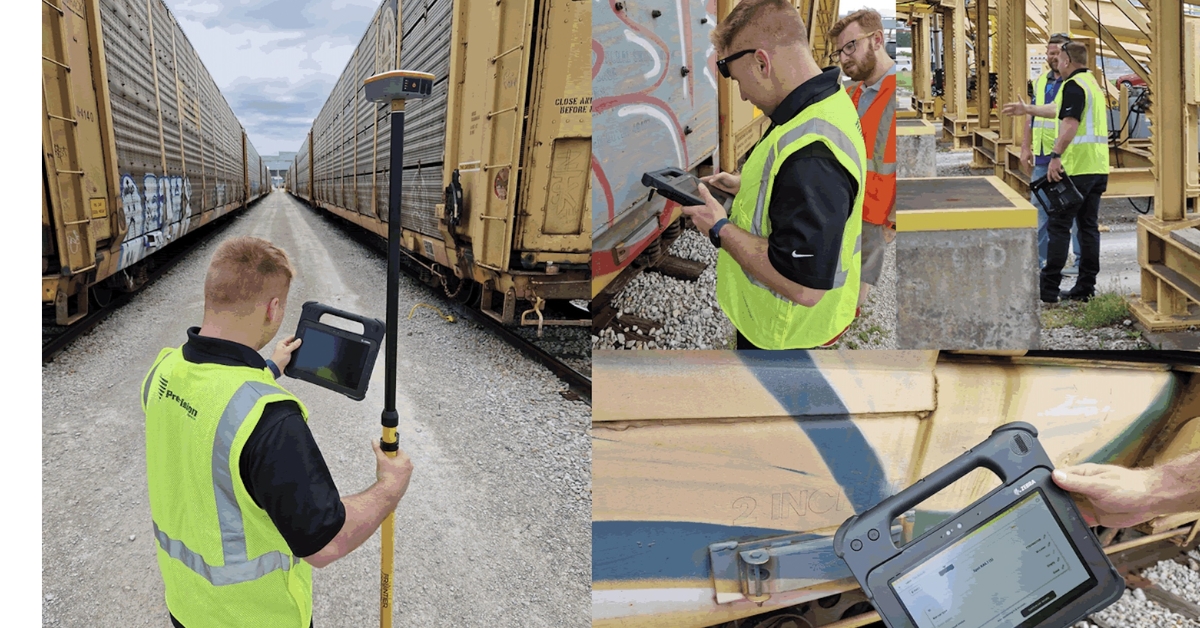One pressing challenge in rail yard management is the issue of electric vehicles (EVs) arriving at dealerships with depleted batteries. This situation can make EVs immobile and disrupt the logistics chain, necessitating immediate solutions.
These depleted batteries hamper the delivery process and impact these vehicles’ sales readiness, creating supply chain bottlenecks and customer dissatisfaction.
This problem has become increasingly urgent as the demand for electric vehicles grows.
According to the International Energy Agency, more than 3 million EVs were sold in the first quarter of 2024, following a significant 35% increase in sales from the previous year. This surge in sales demonstrates a clear shift toward electric mobility, placing additional pressure on logistics operations to adapt and innovate.
FLEXRail solves this challenge by providing AUTOChargit Mobile UTV. This technology ensures that EVs are charged and ready for immediate display and sale upon arrival, enhancing rail operation efficiency and customer satisfaction in vehicle logistics.
What are the key challenges in rail yard management?
Rail yard managers face key challenges such as extensive networks, battery depletion during storage and transport, inaccessibility issues and impacts on sales and customer satisfaction. These problems compound as more electric vehicles are integrated into logistics operations.
Extensive Network and Distance Issues
The finished vehicle logistics network spans considerable distances, encompassing numerous storage areas and facilities.
This scale results in vehicles, especially EVs, being parked and stored for extended periods, which can lead to significant battery depletion.
Jason Wilson, Vice President of our sister company, Precision Vehicle Logistics, captures the magnitude of the challenge: “It’s hard for people to comprehend how big the finished vehicle logistics network is. That logistical network is put under strain due to the inability to move vehicles going dead.”
Battery Depletion During Storage and Transport
Another issue is managing battery health while transporting and storing electric vehicles. As EVs sit idle, their batteries gradually lose charge.
If not properly managed, this can result in vehicles arriving at their destination with insufficient charge to be moved or tested, rendering them immobile.
This disrupts the logistics process and delays the delivery and sale of these vehicles, potentially affecting the downstream supply chain and dealer operations.
Inaccessibility and Mobility Challenges
The complexity of the logistics network further exacerbates these challenges, as Wilson explains: “The reason they are going dead is because of the vast network, distances and the time it takes for these vehicles to travel. They’re stuck in storage areas in facilities that are hard to get to.”
This inaccessibility makes performing routine maintenance or charging operations difficult, which is essential for keeping EVs in a ready-to-sell condition.
Impact on Sales and Customer Satisfaction
The inability to move EVs upon arrival due to depleted batteries affects logistical operations and the sales cycle of these vehicles.
Dealerships face challenges in meeting customer expectations for prompt vehicle delivery, and any delays can significantly impact customer satisfaction and dealership operations.
Understanding these challenges is the first step toward providing effective solutions.
AUTOChargit Mobile UTV – Enhancing in EV Charging and Rail Yard Management
Dasher Lawless Automation’s AUTOChargit Mobile UTV improves rail yard management. It features twin level 2 electric charging stations to support efficient yard movements.
These units ensure charged and ready electric vehicles and offer flexibility and enhanced accessibility.
Key Features and Functionalities:
- Twin Level 2 Charging Stations: These allow for rapid charging, quickly bringing EV batteries up to sufficient levels so they can be moved and processed further, reducing downtime.
- Mobility and Accessibility: The UTV is highly maneuverable, enabling access and service vehicles even in tight or remote facility areas. It is instrumental in expansive rail yards.
- Operational Continuity: By providing a mobile charging solution, AUTOChargit helps maintain the flow of operations, addressing bottlenecks caused by uncharged vehicles and enhancing overall logistical efficiency.
- Extended Cable Reach: Equipped with charging cables extending up to 60 feet, the AUTOChargit can effectively reach and charge vehicles positioned far from fixed charging installations, which is crucial for maintaining the operational capacity of cars throughout the yard.
The AUTOChargit Mobile UTV exemplifies a proactive approach to managing the logistical complexities introduced by electric vehicles in the automotive transport sector.
Its deployment ensures that EVs remain ready for action, supporting continuous and efficient rail yard operations.
Best Practices Case Study: Precision Vehicle Logistics’ Charging Unit at Factory Zero
Implementing diesel-powered charging units by Precision Vehicle Logistics at General Motors (GM) Factory Zero has significantly improved rail yard management. These units have streamlined several key operations:
Autonomous Refueling Control
These units enable GM to manage refueling processes internally, reducing delays typically caused by fuel shortages and reliance on external fuel suppliers.
This control helps prevent bottlenecks in vehicle processing and readiness.

Reduced Operational Downtime
The diesel-powered units provide reliable and consistent charging capabilities.
This reliability is crucial for minimizing production interruptions. It ensures that vehicles are always charged and ready for the next step in the logistics chain.
Swift Malfunction Resolution
Any operational issues with the charging units are promptly addressed, with resolutions typically achieved by the next business day.
This rapid response minimizes disruptions to vehicle manufacturing and shipping schedules.
Simplified Operational Interface
The user-friendly design of these charging units simplifies their operation, which reduces the need for extensive training and ensures timely notifications.
This ease of use increases productivity by enabling staff to operate the units efficiently without specialized training.
Battery Life Enhancement
The units are equipped with built-in 12V battery chargers that help maintain electric vehicle batteries at optimal levels for transport.
This feature ensures that the EVs are ready to move and extends the overall lifespan of the batteries.
Consistent Operational Performance
Combining these features ensures a seamless and continuous production and logistics flow.
This is especially critical to meet the rising demand for electric vehicles, ensuring supply can meet market needs without interruptions.
These enhancements introduced by Precision Vehicle Logistics at Factory Zero have set a new standard in rail yard management. They showcase how targeted innovations in equipment and operational strategies can substantially improve efficiency and reliability in the automotive logistics sector.
Key Features Every Yard Management System Should Have
According to the Supply & Demand Chain Executive, “Today’s YMSs offer various performance features, some of which deliver greater value than others. Knowing which features should be sought in a YMS will help a business weather current disruptions and gain better positioning for the future.”
It recommended five features essential to modern logistics systems:
- Visibility and Real-Time Communication – Essential for managing complex logistics and improving coordination.
- Process Automation – Reduces reliance on manual processes, enhancing efficiency.
- Data Standardization and Advanced Analytics – Supports better decision-making through standardized data processes.
- Optimization Features – Critical for reducing operational costs and improving resource management.
- Future-Ready Capabilities – Prepares operations for technological advancements and autonomous operations.
FLEXRail commits to integrating these cutting-edge features into our rail logistics solutions. We proudly offer advanced capabilities that align with the industry’s best practices.
Comprehensive Rail Logistics Solutions by FLEXRail
FLEXRail, with more than 40 years of experience, offers a broad spectrum of services to optimize automotive rail logistics and enhance operational efficiency. Here are the key services provided:
Transloading and Multi-Modal Solutions
FLEXRail enhances efficient transport by facilitating the movement of goods between rail and truck.
This service allows products to reach destinations not directly accessible by rail, combining the cost-effectiveness of rail with the flexibility of trucking for final delivery.
Contract Rail Switching and Yard Management
FLEXRail manages intraplant rail facilities and develops customized railcar switching plans. This coordination reduces dwell times, improves asset utilization, and enhances overall operational efficiency.
FLEXRail also offers yard management services and pre-trip inspections to support rail operations.
Railcar Maintenance
FLEXRail provides routine and non-routine railcar maintenance services, including tank and hopper cleaning, inspection, repair and scheduling mobile repair units.
They manage maintenance records through systems like the Universal Machine Language Equipment Register (UMLER) and the Equipment Management Information System (EMIS) for comprehensive upkeep and record-keeping.
Rail Technology Solutions
FLEXRail enhances rail logistics efficiency by supporting shippers and yard operators with comprehensive service design, rate analysis, fleet management and demurrage management.
Integrating our sister company’s yard management system, AutoVentive YMS uses radio frequency identification (RFID), automatic equipment identification (AEI) and telematics for heightened visibility and real-time tracking.
It facilitates efficient asset management on tablets and smartphones, optimizing loading operations and ensuring seamless integration across railway networks.
Specialized Automotive Rail Logistics
FLEXRail offers detailed inspections and maintenance for vehicles in transit for automotive logistics.
This focus improves transport reliability and safety, which is crucial for maintaining the integrity of vehicle conditions throughout their journey.
These comprehensive services help FLEXRail exceed the logistical requirements of modern rail transportation, particularly in managing the complexities associated with automotive logistics.
The Future of Rail Yard Management with FLEXRail
The future of railyard management looks promising with continuous technological advancements and strategic implementations, including effective tracking solutions that utilize sensors.
FLEXRail is at the forefront, driving innovation and ensuring railyard operations meet future challenges head-on.
Our commitment to improving logistics efficiency is crucial for sustaining growth in the electric vehicle market and beyond.
Request a demo today to learn more about how FLEXRail can enhance your rail yard management operations and see how our solutions can benefit your logistics needs.




0 Comments